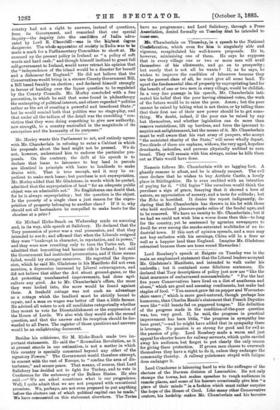Mr. Chamberlain on Thursday, ia a speech to the National
Confederation, which even for _him is singularly able and vigorous, recapitulated his well-known proposals. He is, however, minimising one of them. He says he supposes that in every village one or two or more men will avail themselves of his allotments, and go on to prosperity ; but surely that is not all he wants? If, as he says, he wishes to improve the condition of labourers because they are the poorest class of all, he must give all some land. To upset the fundamental idea of property by expropriating land for the benefit of one or two men in every village, would be childish. In a very fine passage in his speech, Mr. Chamberlain inti- mated his belief that the poor having obtained votes, the work of the future would be to raise the poor. Amen ; but the poor cannot be raised by taking what is not theirs, or by telling them that their first use of their new power should be to get some- thing. We doubt, indeed, if the poor can be raised by any but themselves, and whether legislation can do more than remove restrictions, lift up burdens, and force the ignorant to acquire not enlightenment, but the means of it. Mr. Chamberlain must be well aware that his vast army of paupers, who accept
"the restricted charity of the State," will never wholly depart. Two-thirds of them are orphans, widows, the very aged, hopeless drunkards, imbeciles, and persons physically unfitted to earn bread. They will remain with him always, unless he kills them out as Plato would have done.














































 Previous page
Previous page